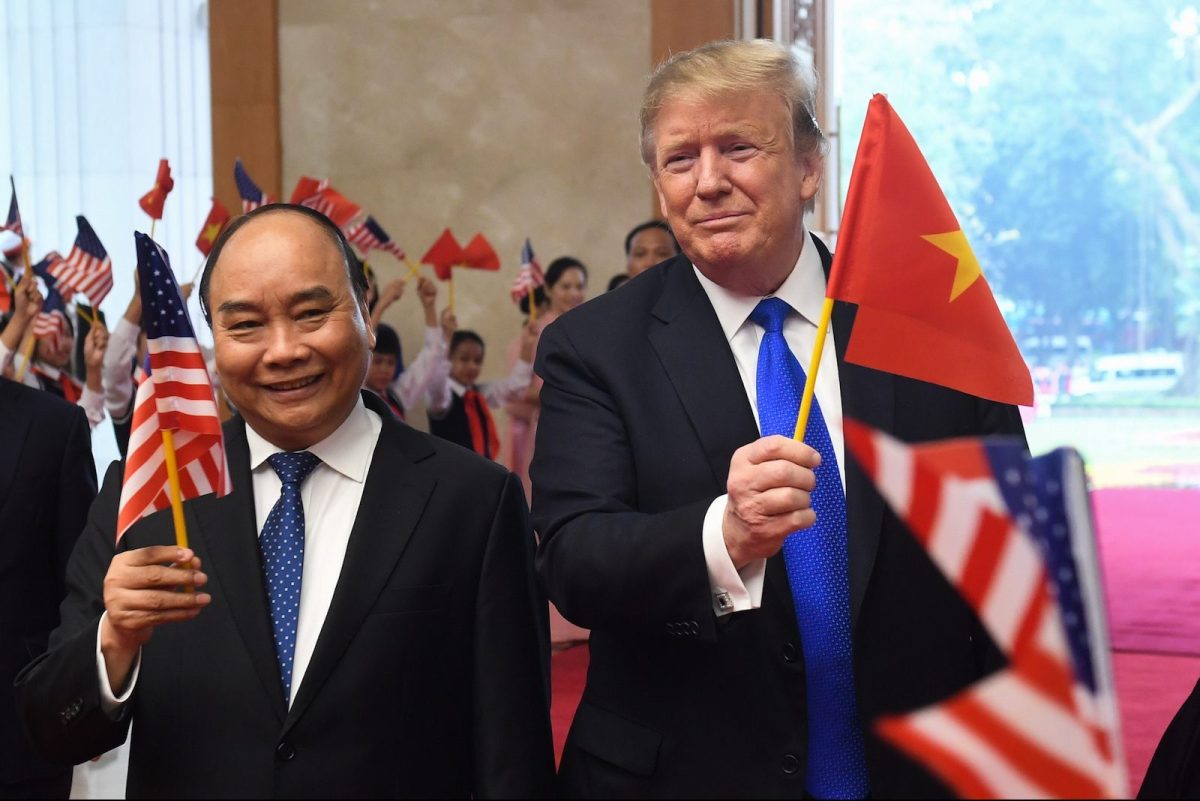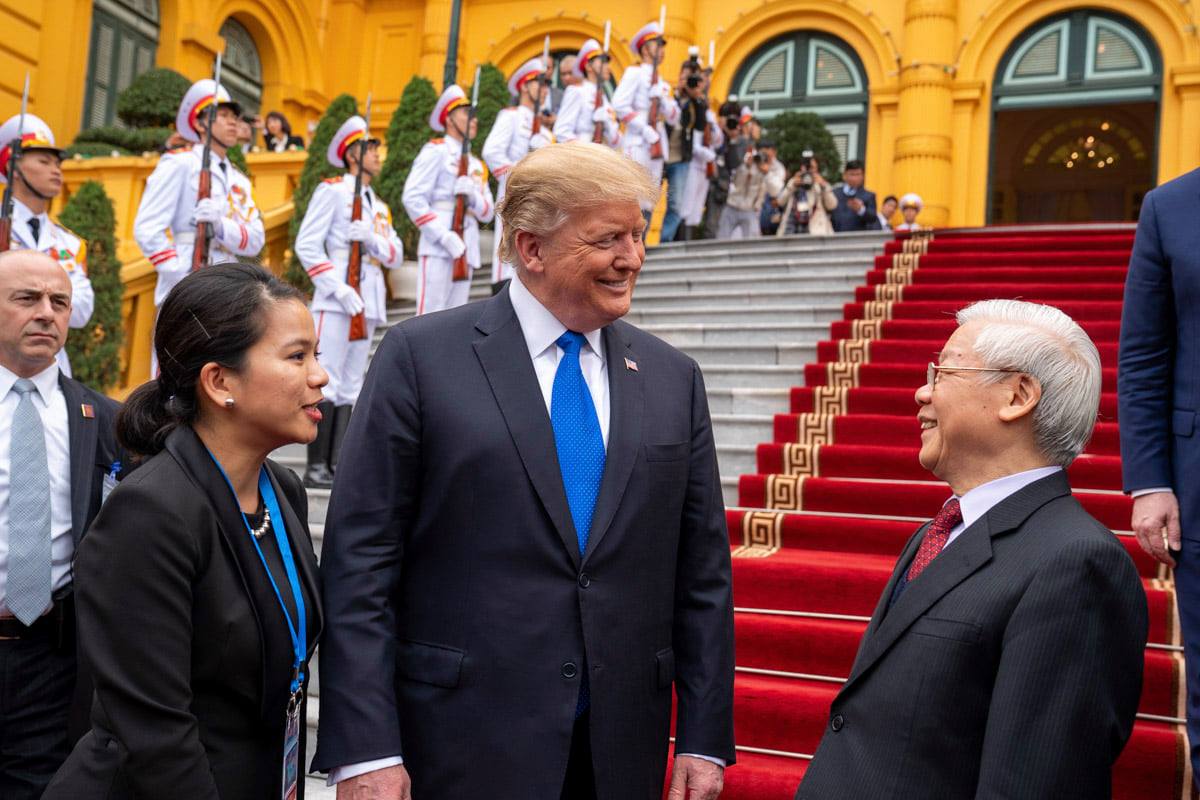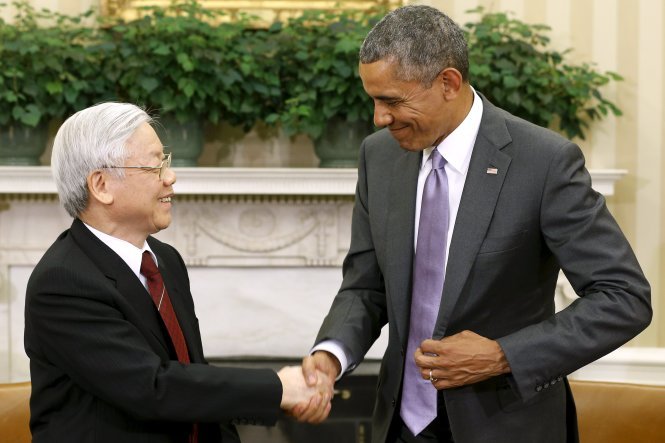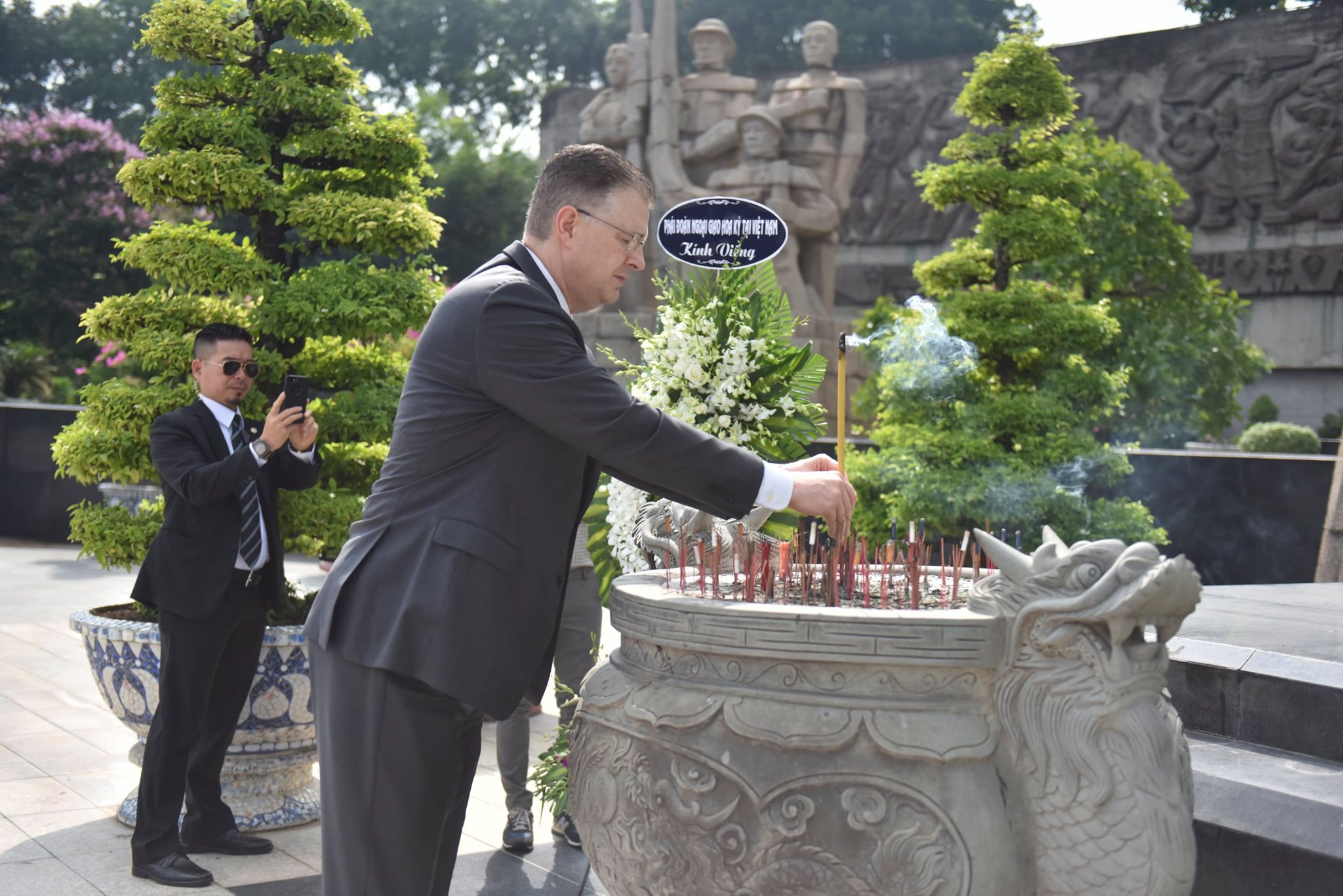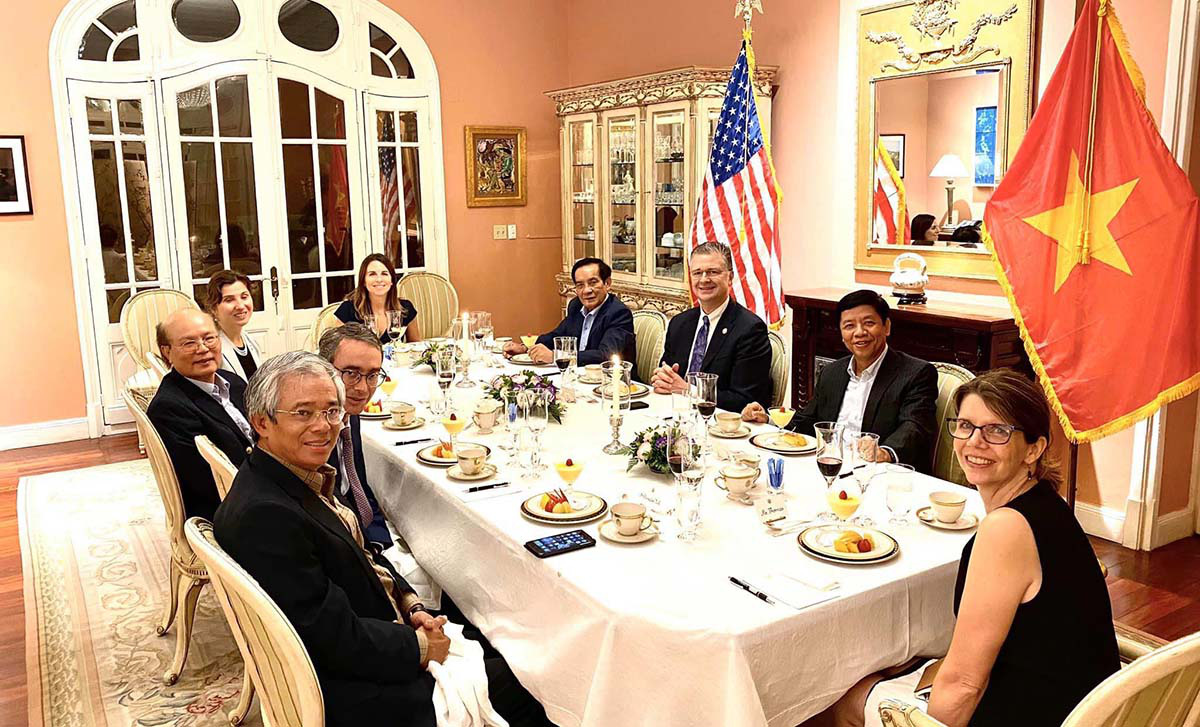In the past 25 years, Vietnam and the United States have gone a long way from archenemies to partners in various domains.
In a new era with emerging contemporary challenges, this relationship is constantly faced with adversities that call for prompt maneuvers to strengthen the rapport.
Tuoi Tre News reached out to U.S. Ambassador to Vietnam Daniel Kritenbrink to reflect on the history and weigh in on the contingencies for these peculiar bilateral relations.
Is 25 years too long or too short for the kind of partnership and friendship that Vietnam and the U.S. have built?
Twenty-five years is a long period of time when you look at a person’s life. I actually think it’s extraordinary how quickly we have made progress and how quickly and successfully we have built partnership and friendship between the U.S. and Vietnam.
I told you my story about Pete Peterson — the first American ambassador [to Vietnam] — in a press conference. I really think about that a lot because I really believe in what he said: what we achieved is remarkable and extraordinary, but it came about because of the really hard work, courage, dedication, and goodwill by leaders on both sides.
I think as long as we continue to have that mindset, [as] long as we remain committed to this partnership together, I think there is nothing we cannot do.
If you look at some statistics, it’s pretty extraordinary: to go from virtually no trade to US$77 billion in trade, and from virtually no security relationship and no relationship between two militaries to today. I will argue that Vietnam is one of our most important security partners in the region and we are cooperating in so many areas.
Look at the people ties that we have built: the fact that there are 30,000 Vietnamese students in the U.S. is really extraordinary. I’m very proud of what we have achieved in the last 25 years and it makes me exceptionally optimistic about what we can achieve over the next 25 years.
If you want proof for how far the U.S.-Vietnam relationship has come, just look at February 2019 when of all the places in the world we could have gone for help with hosting a summit with North Korean leader Kim Jong Un, we came to Vietnam because we have trust and faith in Vietnam and we believe in your skill to carry out such a summit.
Vietnam did a great job and we are very pleased and grateful to Vietnam for that. Vietnam set such a powerful example to all the countries in the world.
|
|
| Vietnamese Party General Secretary and State President Nguyen Phu Trong (right) receives U.S. President Donald Trump in Hanoi, Vietnam, February 2019. Photo: U.S. Embassy in Hanoi |
You just compared 25 years of diplomatic ties between Vietnam and the U.S. with the life of a person. We think that 25 years is a remarkable period of time in the life of a person, as they have gone through so many challenges. In a time of uncertainties at the moment, what do you think are the most difficult challenges and opportunities that the countries face?
I tend to see the opportunities and the challenges as coming hand in hand. For every challenge that we face, it is an opportunity for us together to work to overcome it. I am more of an optimistic, positive person so I would just focus on the opportunities and it will be directly related to the challenges.
I think the first opportunity that we have is to continue to promote our mutual prosperity, and that means continuing to grow our economic and trade relations, ensure that trade relations remain beneficial for both countries, and resolve some market access issues in Vietnam and issues related to the treatment of American companies. I think that is one area that we will need to continue to work on.
And when we talk about economic opportunities in Vietnam, we see tremendous opportunities in the energy sector, healthcare, IT, infrastructure — especially transportation infrastructure — digital services, smart cities, and several more.
On the security side, I think that our view and our interest in the [East Vietnam Sea] are almost completely identical. We both want to see a stable, peaceful region, we want to see a region that is based on rules in which all countries, large and small, play by the same rules, follow international law, and resolve peacefully disputes between them.
If you want to talk about challenges and opportunities, I think COVID-19 [novel coronavirus disease] is probably the most relevant and prominent challenge and opportunity we face today.
The challenge is clear. I think Vietnam’s response has been probably the best in the world. The U.S. has been really proud to be Vietnam’s partner in assisting Vietnam in responding to COVID-19. We have been Vietnam’s health partner now for more than 20 years and have provided more than $700 million in health assistance to Vietnam. But we are so grateful to Vietnam for your assistance to the United States during our time of need, and I know that that assistance in providing masks and other protective equipment has helped save lives.
You started your diplomatic career in 1994, one year before Vietnam and the U.S. began the ice-breaking process and established diplomatic ties. What did you hear about Vietnam at the time? When you came to Vietnam as an ambassador, what was your first impression of the country? How has it changed over 25 years?
I remember just at the start of my diplomatic career, all of the excitement between the United States and Vietnam as we normalized our relations and the year before that – how we lifted the trade embargo. I remember as an American and an American diplomat, again, the excitement and the hope surrounding the start of our new beginning and I was very pleased to see that. It is one of the reasons why I am so honored to be here now as an ambassador.
It has often been said that for many Americans, when they hear the word ‘Vietnam,’ the first thing they would think of is the war. I am proud to say that I am one of the millions of Americans now who know that Vietnam is a beautiful country with beautiful, warm, gracious, hardworking, talented people. That is probably the biggest change, personally, that I have gone through.
My time here as an ambassador over the last three years further reinforces the view that I have had since 2015, when I first started working on Vietnam from Washington, which is Vietnam is one of the most important and most capable partners in the region and, I would argue, in the world.
We have a lot of respect for Vietnam. What Vietnam has achieved itself is extraordinary, and what we achieve together is really remarkable.
|
|
| U.S. President Barack Obama receives Vietnamese Party General Secretary Nguyen Phu Trong at the White House in July 2015. Photo: Reuters |
You were the first U.S. ambassador to visit two cemeteries of fallen Vietnamese soldiers in Quang Tri and Ho Chi Minh City. What are some memorable events with the people that you met there? One wonders what an American ambassador said in his prayers offered at the Vietnamese martyrs' resting place.
I was really honored to be able to visit both the Truong Son Martyrs’ Cemetery in Quang Tri Province and the Martyrs’ Cemetery in Ho Chi Minh City. It was very moving for me to be able to go and I was very gratified that I was allowed to go.
I am proud to be the first American ambassador to visit and somewhat surprised that that is a fact. What I hoped to achieve is that by being the first ambassador to go, such visits can become routine and expected and maybe not newsworthy between our two countries.
More importantly, we want to make a small gesture to demonstrate our goodwill toward Vietnam, our tremendous respect for the sacrifice made by people on all sides during the conflict in the name of patriotism. And hopefully, by demonstrating that respect and honoring all of those who made the ultimate sacrifice we can make a small contribution to building the friendship and partnership between the U.S. and Vietnam and a small contribution to further promoting reconciliation between us.
While I was there, at both cemeteries, what I thought of and prayed for was continued peace between our two great countries and peoples, and I also prayed for the continued peace for all of the souls of those who sacrificed on all sides during that conflict. Those visits have been some of the most meaningful things that I have done during my time in Vietnam and during my career as a U.S. diplomat.
Vietnam’s economy is regaining its momentum after the COVID-19 pandemic. After we joined some new-generation free trade agreements, we are trying to raise the bar for the working condition of laborers. How do you think these will impact Vietnam’s ability to attract investment from U.S. companies. How do we improve to increase our competitiveness and truly become an important trade partner of the U.S.?
Overall, if you look at the history of Vietnam’s economic development, Vietnam has done a tremendous job. The World Bank would say that Vietnam has been probably the world’s second-fastest growing economy in the last 20 years and very well may be the single-fastest growing economy for the next 20.
As Vietnam’s leaders have stated that it is their desire to attract more foreign direct investment, my advice to the Vietnamese leadership and Vietnamese people is to continue to take those steps to create the right regulatory, legal and policy environment inside Vietnam so that American and other investors want to come here.
Vietnam needs to make sure that its tax policies treat foreign companies and investors fairly. Vietnam should continue to make sure that its regulatory policies are issued in a transparent and predictable way. It is important as well for Vietnam to take steps to reduce trade barriers in certain sectors.
|
|
| U.S. Ambassador to Vietnam Daniel Kritenbrink offers incense at the Martyrs' Cemetery in Ho Chi Minh City, June 2020. Photo: U.S. Embassy in Hanoi |
One very critical aspect in the relations between the two countries is the East Vietnam Sea. How will the cooperation between the U.S. and Vietnam change to uphold the responsibilities over the sea and also ensure the rights and interests of participating stakeholders?
It is not just the United States and Vietnam but all countries in the region and the world support international law, international rule of law, peaceful resolution of disputes, freedom of navigation, freedom of overflight, unimpeded commerce, and the right of states to develop natural resources to which they rightfully lay claim.
All of us have an interest in ensuring that the [East Vietnam Sea] remains stable, secure and peaceful, and all of us are going to have to work really hard toward that goal.
We think it is quite concerning, disturbing and deeply disappointing that not only has China continued to aggressively advance its claims, many of which are unlawful, but it is also particularly disappointing that they have chosen to take advantage of the COVID-19 pandemic to do so.
Therefore, we think it is in the interest of all countries who shared the principle that I have just outlined to continue to engage in diplomacy to advance our shared principle. ASEAN [Association of Southeast Asian Nations] has a critical role to play there.
Secondly, it’s important for the United States and other like-minded countries to continue to develop the maritime capacity of partners in the region, whether it’s Vietnam, the Philippines, Malaysia and Indonesia, or whoever else. That is important because the more countries have the means to understand what is happening in their territory and the means to defend their interests, the more it contributes to the stability and makes conflicts less likely.
Thirdly, I think you will continue to see the United States develop our own military capacity and we will carry out our own activities including freedom of navigation operations and present operations to support those principles rooted in international law that I have just described.
In discussions on the two countries’ diplomatic ties, we usually remember John McCain and John Kerry, two iconic U.S. senators who built a strong foundation for this rapport. Who do you think will be the next generation of diplomats and politicians to advance the two countries’ relations in the future?
It is an important question and a question that we talk about a lot inside of the United States as well. First of all, there is virtually unanimous consensus in the United States on the importance of America’s relationship with Vietnam. There is no doubt in my mind that the American public and American leadership, whoever that may be going forward, will continue to emphasize the relationship with Vietnam. I think America’s interests in this part of the world, including in developing our ties with Vietnam, are going to be enduring.
Look at who visited here in the last several years, including just in the last two and a half years since I have been ambassador. I do not have the numbers in front of me but we have had at least 11 U.S. senators come here since I have been here. There was a nine-member U.S. Senate delegation led by Sen. Patrick Leahy. He came with eight other senators.
What I was impressed by every single one of them was [the fact that] they said they wanted to be a strong supporter of the U.S.-Vietnam partnership. They are Sen. Kaine, Sen. Baldwin, Sen. Udall, Sen. Lahey, Sen Portman, and Sen. Murkowski. Give me a little more time and I will come up with the other three.
But I think it shows that from an older generation of leadership, like Sen. Patrick Leahy, who was talking the leadership role from the very beginning for decades, plus all the younger senators that came on that trip, there are tremendous opportunities there.
You can think about Sen. Tammy Duckworth who visited here last year and then also Sen. Cory Gardner who has been here, so there are at least 11 senators that I can think of off the top of my head who have just been here.
And if you think about members of the House [of Representatives] who have visited here as well: I know Rep. Seth Moulton got here last year. There is tremendous interest in Congress, in both Houses, in our partnership.
Look at the commitment of the current administration: President Trump has been here twice. I think you will continue to see American academics here on a regular basis.
There’s virtually unanimous consensus in the United States among the public and the leadership about the importance of our relationship with Vietnam. I think you are going to find that support to be pretty broad-based among both parties, and again among the public and leadership.
I hope you’ve seen from my answer that there is a long list of candidates including on Capitol Hill who, I think, value the importance of this relationship.
|
|
| U.S. Ambassador to Vietnam Daniel Kritenbrink hosts former and incumbent Vietnamese ambassadors to the U.S. at the U.S. Embassy in Hanoi, July 7, 2020. Photo: U.S. Embassy in Hanoi |
Discussing the future
Last week, I joined three former Vietnamese ambassadors to the United States: Le Bang, Le Cong Phung, and Pham Quang Vinh for an intimate dinner with Daniel Kritenbrink, the incumbent U.S. ambassador to Vietnam.
The discussion revolved around our experience in the two countries as diplomats. We also discussed our consideration of the future of the two countries’ relationship.
Interestingly enough, we shared the same feeling that the relations between Vietnam and America have taken giant steps forward in the last 25 years.
From ex-enemies, both sides have contributed reconciliation efforts to foster a comprehensive partnership, one that just two decades ago was still beyond the wildest imagination.
The impressive economic, trade and investment statistics; the cooperation on politics, diplomacy, public defense as well as regional security issues stand as bright examples for the proud achievements that the two countries have promoted.
I paid special attention to the story of the U.S. ambassador where he mentioned his visit to Truong Son Martyrs’ Cemetery with the Vietnamese press, saying it was the most emotional trip of his tenure in Vietnam — most notably when he met the Vietnamese veterans and walked with them on the former war trouble spot of Ham Rong Bridge.
The image is not merely symbolic but also reflective of the faith cultivated between the two countries over the last 25 years. We have every right to take that as a source of hope, using it to look forward for the fruit of our cooperation in the years to come.
Recently, the United States has affirmed their support for Vietnam in the search for soldiers missing in action as well as in correcting war legacies. I personally welcome this gesture, for it is the stepping stone for the two countries toward a brighter future.
The intimate conversation was also the time for us to reflect on the milestones of the Vietnam-U.S. rapport that we have witnessed. During my term as ambassador (2011-14), the official visit of then-Vietnamese State President Truong Tan Sang in 2013 marked a new era of the Vietnam-U.S. relations. From that point onward, the two countries have been able to call each other “comprehensive partners.”
In the joint statement between the U.S. and Vietnam during the visit of President Sang, the principle of “respect for each other’s political systems” was highlighted besides the other principles of ”respect for the United Nations Charter, international law, independence, sovereignty, and territorial integrity,” the assemblage of which has been upheld as the tenets of these bilateral relations.
In the past seven years, intensive commitments from the leadership of the two countries on the basis of respect for shared interests have strengthened trust in Vietnam-U.S. relations, predicating further pertinent cooperation.
I completely agree with the U.S. ambassador that whether the relations are called “comprehensive partnership” or “strategic partnership” is of no great importance. What we should be more concerned about is the way to make these relations bloom into new achievements with improved pertinence and efficacy in the future.
Looking back on the past 25 years, us mediators for these special relations are even more convinced that the achievements we got are just the beginning.
The future is embedded with challenges, but as long as we keep our trust and persistence with the concurred values, the two countries would be up to see even bigger leaps forward in the future.
Nguyen Quoc Cuong — former Vietnam ambassador to the United States
Like us on Facebook or follow us on Twitter to get the latest news about Vietnam!



